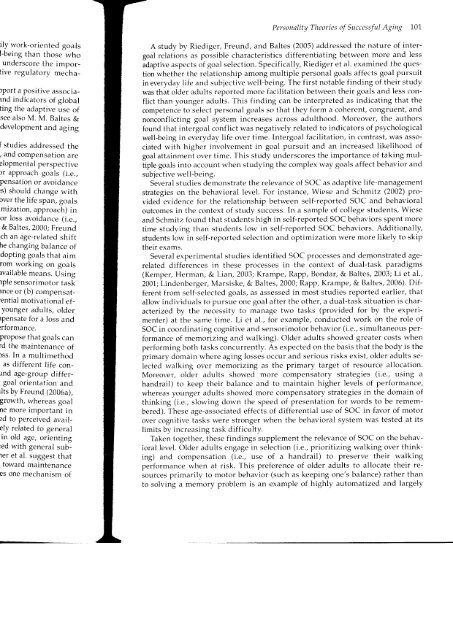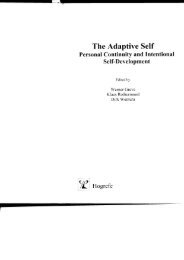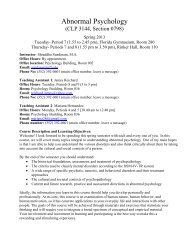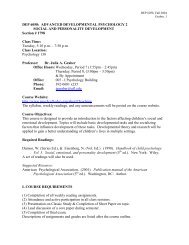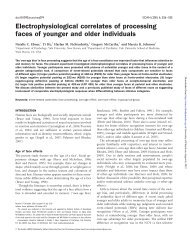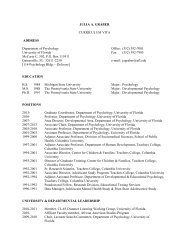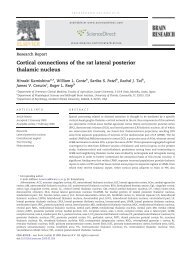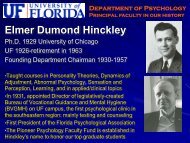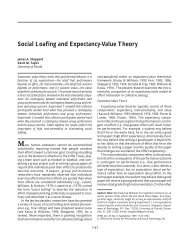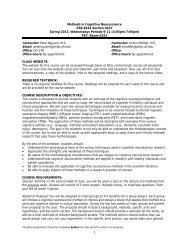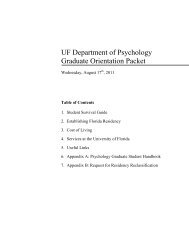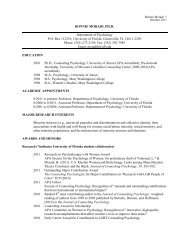Personality theories of successful aging - University of Florida ...
Personality theories of successful aging - University of Florida ...
Personality theories of successful aging - University of Florida ...
You also want an ePaper? Increase the reach of your titles
YUMPU automatically turns print PDFs into web optimized ePapers that Google loves.
Personalittl Theories o,f Successful Aging 101<br />
ily work-oriented goals<br />
t-being than those who<br />
underscore the importive<br />
regulatory mecharport<br />
a positive associatnd<br />
indicators <strong>of</strong> global<br />
ting the adaptive use <strong>of</strong><br />
see also M. M. Baltes &<br />
development and <strong>aging</strong><br />
I studies addressed the<br />
, and compensation are<br />
elopmental perspective<br />
:r approach goals (i.e.,<br />
pensation or avoidance<br />
rs) should change with<br />
cver the life span, goals<br />
mization, approach) in<br />
or loss avoidance (i.e.,<br />
& Baltes, 2000; Freund<br />
ch an age-related shif t<br />
he changing balance <strong>of</strong><br />
dopting goals that aim<br />
rom working on goals<br />
lvailable means. Using<br />
rple sensorimotor task<br />
lnce or (b) compensat-<br />
'ential motiva tiona I efyounger<br />
adults, older<br />
tpensate for a loss and<br />
lrformance.<br />
propose that goals can<br />
:d the maintenance <strong>of</strong><br />
)ss. In a multimethod<br />
as different life conrnd<br />
age-group differgoal<br />
orientation and<br />
Llts by Freund (2006a),<br />
growth, whereas goal<br />
ne more rmportant in<br />
:d to perceived availely<br />
related to general<br />
in old age, orienting<br />
:ed with general subrer<br />
et al. suggest that<br />
toward maintenance<br />
es one mechanism <strong>of</strong><br />
A study by Riediger, Freund, and Baltes (2005) addressed the nature <strong>of</strong> intergoal<br />
relations as possible characteristics differentiating between more and less<br />
adaptive aspects <strong>of</strong> goal selection. Specifically, Riediger et a1. examined the question<br />
whether the relationship among multiple personal goals affects goal pursuit<br />
in everyday life and subl'ective well-being. The first notable finding <strong>of</strong> their study<br />
was that older adults reported more facilitation between their goals and less conflict<br />
than younger adults. This finding can be interpreted as indicating that the<br />
competence to select personal goals so that they form a coherent, congruent, and<br />
nonconflicting goal system increases across adulthood. Moreover, the authors<br />
found that intergoal conf lict was negatively related to indicators <strong>of</strong> psychological<br />
well-being in everyday life over time. Intergoal facilitation, in contrast, was associated<br />
with higher involvement in goal pursuit and an increased likelihood <strong>of</strong><br />
goal attainment ol.er time. This study underscores the importance <strong>of</strong> taking multiple<br />
goals into account when studying the complex way goals affect behavior and<br />
subjective well-bei ng.<br />
Several studies demonstrate the relevance <strong>of</strong> SOC as adaptive life-management<br />
strategies on the behavioral level. For instance, Wiese and Schmitz (2002) provided<br />
evidence for the relationship between self-reported SOC and behavioral<br />
outcomes in the context <strong>of</strong> study success. In a sample <strong>of</strong> college students, Wiese<br />
and Schmitz found that students high in self-reported SOC behaviors spent more<br />
time studying than students low in self-reported SOC behaviors. Additionally,<br />
students low in self-reported selection and optimization were more likely to skip<br />
their exams.<br />
Several experimental studies identified SOC processes and demonstrated agerelated<br />
differences in these processes in the context <strong>of</strong> dual-task paradigms<br />
(Kemper, Herman, & Lian, 2003; Krampe, Rapp, Bondar, & Baltes, 2003; Li et al.,<br />
2001; Lindenberger, Marsiske, & Baltes,2000; Rapp, Krampe, & Baltes, 2006). Different<br />
from self-selected goals, as assessed in most studies reported earlier, that<br />
allow individuals to pursue one goal af ter the other, a dual-task situation is characterized<br />
by the necessity to mana€le two tasks (provided for by the experimenter)<br />
at the same time. Li et al., for example, conducted work on the role <strong>of</strong><br />
SOC in coordinating cogritive and sensorimotor behavior (i.e., simultaneous performance<br />
<strong>of</strong> memorizing and walking). Older adults showed greater costs when<br />
performing both tasks concurrently. As expected on the basis that the body is the<br />
primary domain where <strong>aging</strong> losses occur and serious risks exist, older adults selected<br />
walking over memorizing, as the primary target <strong>of</strong> resource allocation.<br />
Moreover, older adults showed more compensatory strategies (i.e., using a<br />
handrail) to keep their balance and to maintain higher levels <strong>of</strong> performance,<br />
whereas younger adults showed more compensatory strategies in the domain <strong>of</strong><br />
thinking (i.e., slowing down the speed <strong>of</strong> presentation for words to be remembered).<br />
These age-associated effects <strong>of</strong> differential use <strong>of</strong> SOC in favor <strong>of</strong> motor<br />
over cognitive tasks were stronger when the behavioral system was tested at its<br />
limits by increasing task diff iculty.<br />
Taken together, these findings supplement the relevance <strong>of</strong> SOC on the behavioral<br />
level. Older adults engage in selection (i.e., prioritizing walking over thinking)<br />
and compensation (i.e., use <strong>of</strong> a handrail) to preserve their walking<br />
performance when at risk. This preference <strong>of</strong> older adults to allocate their resources<br />
primarily to motor behavior (such as keeping one's balance) rather than<br />
to solving a memory problem is an example <strong>of</strong> highly automatized and largely


